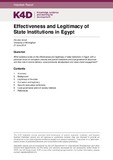| dc.contributor.author | Ismail, Zenobia | |
| dc.coverage.spatial | Egypt | en |
| dc.date.accessioned | 2019-08-05T13:24:52Z | |
| dc.date.available | 2019-08-05T13:24:52Z | |
| dc.date.issued | 2019-06-21 | |
| dc.identifier.citation | Ismail, Z. (2018). Effectiveness and Legitimacy of State Institutions in Egypt. K4D Helpdesk Report. Birmingham. UK: University of Birmingham. | en |
| dc.identifier.uri | https://opendocs.ids.ac.uk/opendocs/handle/20.500.12413/14628 | |
| dc.description.abstract | This rapid literature review focuses on the legitimacy of the state in Egypt after the 2013 military coup, with a focus on three issues: corruption, security and justice institutions, and local governance and civil society relations. The main finding is that since the 2013 coup the new military government has embarked on widescale repression to quell dissent and consolidate its power. The legitimacy of the authoritarian government rests on its ability to provide jobs, public services and security. So far there is little evidence that the government is achieving these objectives (Brechenmacher, 2017; Hamzawy, 2017). However, the crackdown on protests, nongovernmental organisations (NGOs) and religious structures leaves little space for citizens to express their dissatisfaction. There is very little literature on topics such as governance, state legitimacy, corruption, justice institutions and local governance in Egypt which is published after 2012. There was a flurry of literature around the 2011 revolution, but not much has been published since 2012. Experts contend that it is very dangerous and difficult to conduct research in Egypt and therefore little research is published in the academic and policy literature. The limited literature which is available after 2013 (in the academic and grey literature) focuses primarily on the growing authoritarianism and human rights abuses of the Egyptian state. This rapid literature review was able to find two articles which discuss the strategies that the authoritarian government uses to maintain its legitimacy. The limited literature does not provide enough evidence to postulate about the future stability of the Egyptian state. | en |
| dc.language.iso | en | en |
| dc.publisher | IDS | en |
| dc.relation.ispartofseries | K4D Helpdesk Report;621 | |
| dc.rights.uri | https://www.nationalarchives.gov.uk/doc/open-government-licence/version/3/ | en |
| dc.subject | Governance | en |
| dc.subject | Politics and Power | en |
| dc.subject | Security and Conflict | en |
| dc.title | Effectiveness and Legitimacy of State Institutions in Egypt | en |
| dc.type | Helpdesk | en |
| dc.rights.holder | © DFID - Crown copyright 2019 | en |
| dcterms.dateAccepted | 2019-06-21 | |
| rioxxterms.funder | Department for International Development, UK Government | en |
| rioxxterms.identifier.project | K4D | en |
| rioxxterms.version | VoR | en |
| rioxxterms.funder.project | 238a9fa4-fe4a-4380-996b-995f33607ba0 | en |

